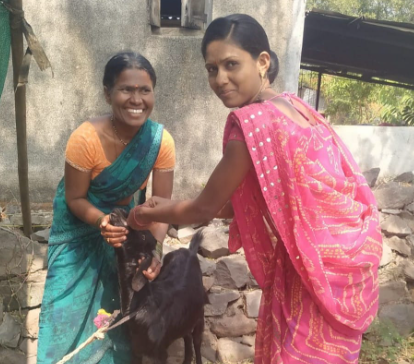Priya Hazare, from Chinchpur Khurd village in Osmanabad District of Maharashtra, learnt about SSP when she joined a goat-rearing support group made up of women farmers in her village in 2021. Goat rearing was a common practice in Priya tai’s village. In 2020, due to insufficient income from farming, Priya tai had begun goat rearing as well. However, with no veterinary support and little scientific knowledge on raising goats, Priya tai and other farmers in the village faced issues such as malnutrition, sickness and even death of young goats on a regular basis.
In January 2022, Priya tai eagerly volunteered to attend the Pashu Sakhi training when the opportunity arose. Through the Pashu Sakhi training provided by SSP, Priya tai learnt about sanitation and hygiene needed to raise goats, the importance of vaccination and deworming, the treatments for common ailments in goats, recipes for creating nutritious feed and the use of natural resources like spices and neem oil to improve goat health. As a Pashu Sakhi she started imparting this knowledge to others.
When Priya tai first started working as a Pashu Sakhi in her village, she says that only five women from her goat-rearing support group were willing to listen to her advice and implement the new practices. It took many months and it was only after she was able to cure a goat who was ill, that people began to trust and listen to her. In the last one year, Priya tai has vaccinated, dewormed and treated over a hundred goats in her village. While initially starting with members of her group, today she works with villagers from across her community. Priya tai also goes to the closest town herself, to purchase vaccines and other medicines needed to carry out her job as a Pashu Sakhi. She receives her own income by providing these services to her community members, and has become financially independent as a result.
Priya tai continues to liaison with SSP’s Cluster Livestock Manager, who provides her with guidance and support when she faces any difficulties. With an increase in the health and nutrition of goats, and their reduced mortality, villages have also improved their income by selling the goats at a much higher price. For example, a goat which would sell for Rs.5000 previously, now sells for around Rs.9000. Seeing how goat rearing was becoming a successful venture in the village, ten more women have also started goat rearing in the past year.“In the beginning, people couldn’t believe that a woman was able to work with livestock and provide medical support to goats. Today, the same people respect the knowledge that I have, and are willing to listen to me and the information that I share with them,” says Priya Hazare, on overcoming biases in her community.
Swayam Shikshan Prayog
December 27, 2022

